B: We particularly want to thank the members of the VOV Listeners ’Clubs in Bangladesh and Pakistan for sending us beautiful National Day greetings.
A: On National Day, September 2, VOV will produce a special program highlighting the significance of the August Revolution, which took place on August 19, 1945 and paved the way for the founding of the Democratic Republic of Vietnam on September 2, 1945, now the Socialist Republic of Vietnam.
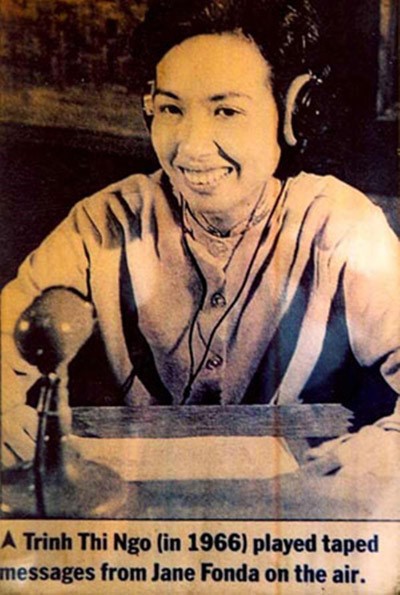 Trinh Thi Ngo on an American newspaper in 1966 Trinh Thi Ngo on an American newspaper in 1966 |
B: To mark the 74th founding anniversary of the Voice of Vietnam, and also the birthday of the English service, September 7th, we will dedicate our programs on this day to the development of VOV, and the dedicated members of the VOV English service, as well as our predecessors, like Trinh Thi Ngo, whose voice has remained in the mind of the generations of VOV listeners, including foreign friends and former GIs in Vietnam, who affectionately called her Hanoi Hannah.
A: We’ll also tell you the story of Ms Mariam Ansara, who we called Havana Hannah. She was a VOV news announcer who reported on the war in Vietnam for American audiences daily. She was part of one of the most significant moments in Vietnam’s history. You can check out her amazing story in the upcoming program.
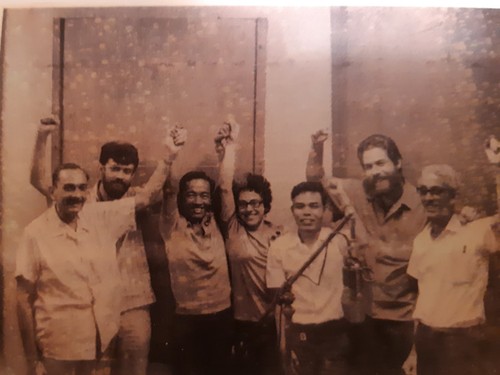 The English Department team at Radio Havana celebrates the moment following the transmission of the historic news bulletin on the signing of the Paris Peace Accords, January, 1973. The English Department team at Radio Havana celebrates the moment following the transmission of the historic news bulletin on the signing of the Paris Peace Accords, January, 1973. |
B: We’d like to take this opportunity to thank you, our dear listeners, for tuning in to VOV for so many years and supporting our shortwave broadcast, website and online platform.
A: Your support has been a source of encouragement and impetus for us to further improve our programs to serve as a bridge linking Vietnam with the rest of the world and as a medium through which we can introduce Vietnam's land, people, and culture to the wider world.
A: This week Feoana Rahman of Bangladesh listened to VOV from 10:00 to 10:30 UTC and from 16:00 to 16:30 UTC on the frequency of 7220 khz. He wrote: “The signal is very strong. I enjoy VOV programs very much. My favorite programs are Current Affairs, the Sunday Show, Saturday Report, Colorful Vietnam and of course, the Letter Box. Thanks for the informative programming. My question is: What is the national animal of Vietnam? ”
B: As a matter of fact, Vietnam does not designate any animal as its national animal, but the image of the dragon was used as a symbol of wealth and prosperity in feudal times, and today the soaring dragon symbolizes Vietnamese national development.
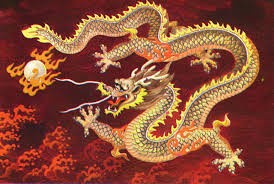 The dragon symbolizes power The dragon symbolizes power |
A: In the Vietnamese belief system, the Dragon is a supernatural creature closely associated with the lives of the people. It symbolizes luck, intelligence, nobility, and power, leading the 12 animals of the zodiac.
B: In the Vietnamese culture, the dragon symbolizes the supreme power of the King. The dragon’s association with royalty is revealed by the names given to various aspects of the king's persona - royal tunics, royal boat, royal figure, and royal countenance.
A: The dragon tops the 4 sacred animals, followed by the unicorn, the tortoise and the phoenix. Every Vietnamese person knows the legend of Lac Long Quan and Au Co. Lac Long Quan, the King Dragon of the Lac Bird Clan, is known as the forefather of the Vietnamese people.
B: He is said to have been the son of a dragon, while his wife, Au Co, was the daughter of a fairy. This is the origin of the Vietnamese proverb “Children of Dragon, Grandchildren of Fairies".
A: The dragon appears very early on in the Dong Son culture dating back more than 2,000 years ago. Carvings have been found on Dong Son drums, depicting the Vietnamese tradition of worshiping clouds, rain, thunder and lightning to encourage bumper crops. The Dragon was the symbol of prosperity and power in the time of Vietnam’s feudal regimes. In the autumn 1010, King Ly Thai To moved his capital from Hoa Lu in Ninh Binh province to Dai La, now Hanoi.
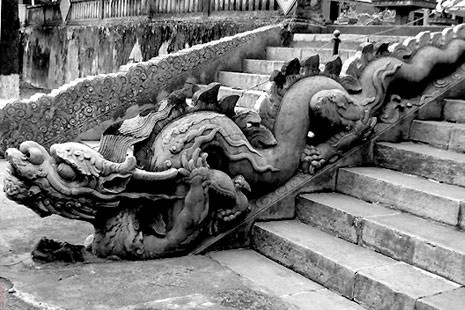 The image of dragon is featured widely in Vietnam's ancient architectures The image of dragon is featured widely in Vietnam's ancient architectures |
B: Legend has it that when the royal barge landed at Dai La, the king saw a golden dragon rise into the sky. Taking this as a good omen, he named his new capital Thang Long, Rising Dragon.
A: During the Ly dynasty from the 11th to the early 13th century, depictions of the dragon were quite sophisticated and unique. The dragon's elaborate head is raised, the flame-colored crest is prominent, and a jewel is held in its jaws. Its mane, ears and beard flutter gracefully, while its lithe, undulating body soars above the waves. Its lithe, serpentine curves taper gradually to the tail. The body has 12 sections, symbolising the 12 months of the year.
B: The dragon plays an important role in Vietnamese cultural life, with dragon dances, dragon boat races, and the children’s game of Dragon-Snake.
A: This week, Siddhartha Bhattacharjee, a regular listener in India sent us a reception report for the program from 16:00 t0 16:30 on August 20 on the frequency of 7220 khz and reported a SINPO of all 4s. He asked about Vietnamese films honored by the Oscar Committee.
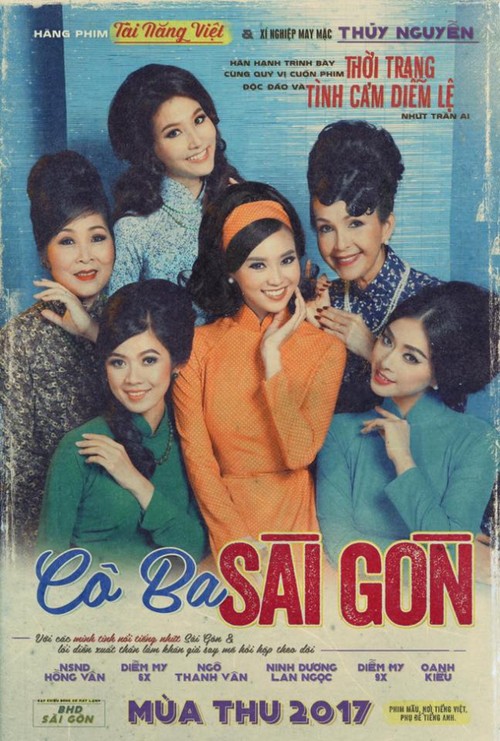 The Tailor film was submitted for the Academy Award for Best International Feature Film in 2017 The Tailor film was submitted for the Academy Award for Best International Feature Film in 2017 |
B: Vietnam has submitted films for the Academy Award for Best International Feature Film since 1993. The film “Scent of Green Papaya” by Director Tran Anh Hung was Vietnam’s first submission for the 1993 awards. Despite the film being financed and produced in France, Hung asked permission to represent Vietnam instead. The film uses mainly Vietnamese language and the characters are portrayed by Vietnamese actors. It was the only Vietnamese film to secure a nomination, and was the first nomination secured by a Southeast Asian country in the category.
A: “Scent of Green Papaya” and subsequent submissions – “Gone, Gone Forever Gone” by Ho Quang Minh, in 1996, “Three Seasons” by Tony Bui in 1999, and “Vertical Ray of the Sun” in 2000 by Tran Anh Hung were all directed by overseas Vietnamese directors.
B: Vietnam initially received an invitation from AMPAS to participate in the competition in 2006, when a requirement was introduced that a film needed to be commercially-released for at least seven consecutive days in a movie theater in its home country during the eligibility period.
A: “The Buffalo Boy” was the first selection by the Ministry of Culture and Information following the invitation. As of 2019, Vietnam has submitted fourteen films, “The Tailor” by Tran Buu Loc and Kay Nguyen submitted in 2017 was the most recent submission.
B: Today, we’d like to acknowledge letters and emails from Richard Nowak of the US, Shyamal Kumar Banerjee and Ram Babu Kumar of India, Muhammad Aqeel Bashir of Pakistan, and Eti Mode of Bangladesh.
A: Thank you all for your reports and feedback. We’ll send you QSL cards to confirm them. We welcome your feedback at: English Service, VOVworld, the Voice of Vietnam, 45 Ba Trieu street, Hanoi, Vietnam. Or you can email us at: englishsection@vov.org.vn. You’re invited to visit us online at vovworld.vn, where you can hear both live and recorded programs.
B: Check out our VOV Media App available on both the IOS and Android platform to hear our live broadcasts. We look forward to your feedback on the mobile version. Once again, thank you all for listening. Goodbye until next time
,